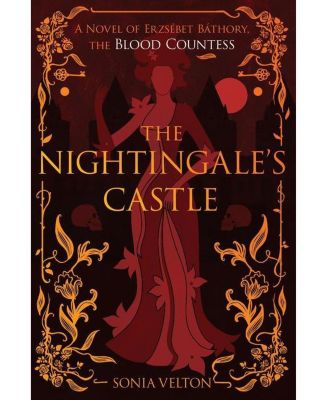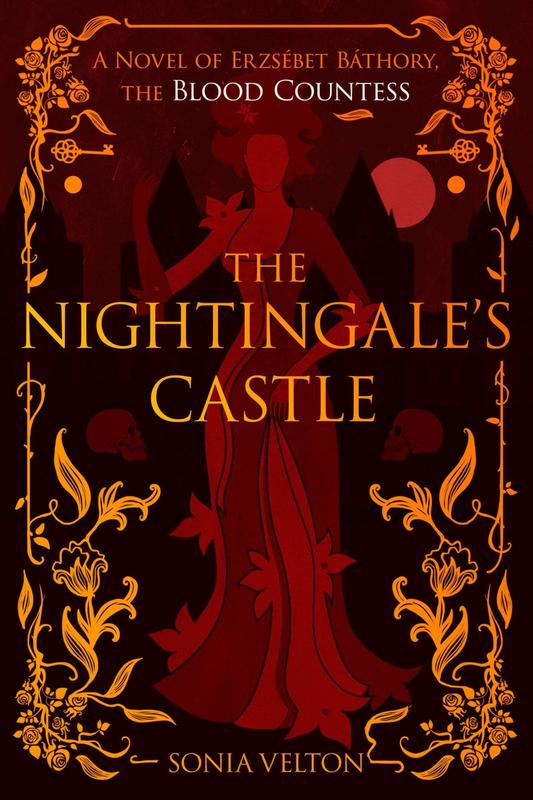The Nightingale's Castle: A Novel of Erzsebet Báthory, the Blood Countess by Sonia Velton
Product Details
Web ID: 19875892Strong Historical Fiction
Actual Rating 4.5 This book is advertised as being a “feminist reimagining” of the Bathory story – it’s been popular lately to advertise books as “feminist retellings” and they generally leave me disappointed and questioning if folks know what feminism actually is. But finally, truly, this is a book that feels worthy of making that claim. I’m a little ashamed to admit I never questioned the horrible tales and lore surrounding Bathory and instead accepted it at face value. But reading this work was like a “duh” moment for me – once again, I remembered that all recorded history is biased, especially true for older history that is less documented. But on to the book itself. The author did an amazing job with the characters. The book is told in the third-person present, so we get to see the feelings and thoughts of several characters, though the work is focused on Boroka, a maidservant at the castle. Every character was well fleshed out and felt realistic, adding much to the story. The setting was also excellently written. The time and setting came to life through all the little details incorporated, ranging from the food, to witchcraft, to cleaning linens. The amount of research the author did was quite evident and elevated the entire experience. I loved that there was a little magical realism woven through, just enough to add to the atmosphere. This book being based on the Bathory story, there are some dark moments and details incorporated throughout the book. They never felt overdone or gratuitous, but just keep it in mind that this isn’t a light or feel-good read. If you enjoy slower historical fiction, actual feminist retellings, and the Bathory story, then this is a must read. My thanks to NetGalley and Harper Perennial for allowing me to read this work. All thoughts and opinions expressed in this review are my own.
Recommends this product

Customer review from barnesandnoble.com
A Delicious Piece of Dark History
The Nightingale's Castle: A Novel of Erzsébet Báthory by Sonia Velton is a historical fiction novel based on the terrifyingly true story about a Hungarian Countess alive during the 1600s who was accused of torturing and murdering virgin girls and bathing in their blood to preserve her youth and beauty. She is infamously known for being so shockingly and sadistically monstrous, she still reigns superior as the face of evil so abhorrent it’s rivaled by only a few other wretched souls from the darkest chapters of history. As time went on, rumors grew to such grossly engorged proportions, one wouldn’t even know where to begin to identify fact from fiction in a tale as cold blooded and twisted as this one, and the truth will likely remain shrouded in mystery for forever. The countess went on trial for torturing and murdering over 600 young girls and women within her household, but was convicted on conjecture and absent circumstantial evidence and eventually died under suspicious circumstances, all of which infuriatingly thickens the miasma of mystery and legend surrounding her bloody legacy. Was she a vicious and prolific serial killer or was she just unfortunate enough to have been born a woman? What is really striking about this book is the uniquely feminist approach the author takes on the countess’s bloody story. I would say that I know a good bit more than the average person on gothic literature, dark histories, and horrifying myths and monsters; however, I have not yet run across such an interesting perspective on the Blood Countess, a woman believed to be so shockingly inhuman she is debatably the inspirational lifeblood pumped into origin stories such as Dracula and Carmilla, which makes her the real-life harbinger to the births of some of humanity’s worst nightmares in literature. After reading this book and becoming inspired to do my own independent research on the countess, I was astounded by my own assured belief in facts that were never really facts at all. Could her story be written in the pages of history not with the blood of virgins murdered by her own hand, but with her own blood exsanguinated by the hand of men? Mankind has always insatiably hungered for money, sex, and power. Erzsébet Báthory’s position of power, affluence, and influence as a widowed noble woman with the protection of her married name and strong familial ties to other powerful men in the region would have afforded the countess with significant freedoms to autonomy and independence. Motivations alluded to in the book for possibly witch-hunting the countess include men feeling threatened by her station and freedoms within the Hungarian aristocracy, lusting with irrepressible avarice for her substantial material wealth, or simply becoming incandescent with sanctimonious entitlement over women in general. I am convinced a very compelling argument is made about man being the real-life monster of the countess’s story. Sonia Velton has written an especially propulsive story that evokes strong reader intrigue and stokes the fires of feminine rage. There is thoughtful character development, the plot is saturated in gothic tragedy, and the atmosphere is practically pulsing with dread by the end of the book. My interest was immediately grabbed in the historical note, epigraph, and prologue. Personally, I was challenged to turn inward to reexamine preconceived verdicts and poorly drawn conclusions within the life portrait of the Blood Countess. This book now has me looking at other notorious women in history with a different lens. I loved this book, the thoughts it left me chewing, the questions it had me asking, and the research it had me conducting. I very much recommend this book to anyone interested in historical fiction (of course) and the darker side of history! Thank you so much to NetGalley and Harper Perennial and Paperbacks for the ARC and the opportunity to share what I think! All opinions are my own. Publication is July 30th!
Recommends this product

Customer review from barnesandnoble.com
Interesting
Countess Erzsébet Báthory is famous for bathing in the blood of virgins. But what is the truth of these claims? Countess Erzsébet Báthory is a remarkable woman doing what is considered to be a man's job running of her estates and property. Could jealousy be behind the claims she's killing young women? I was really impressed by the author's research and crafting of Countess Erzsébet Báthory's story. I look forward to more of this author's work in the future. Until next time Happy Reading! I want to thank Harper Perennial for this ARC via Netgalley.
Recommends this product

Customer review from barnesandnoble.com
Thought provoking
🎧3.5⭐️ A new to me historical / women’s fiction author. Inspired by history Erzsébet Báthory gained notoriety as the blood Countess accused of the death of over 600 peasant girls in Hungary. In 1573 the Countess gave birth to an illegitimate girl, on birth she was bundled up and sent to live with a peasant family. 15 years later people from the Castle are sent to procure workers, and Boróka is sent to work at the castle. Firstly with the names and place names I think it was an easier option having the audiobook with someone doing the pronunciations for me. It’s also an earlier period in history than I am used to reading. The language used didn’t feel ‘old’ which made it easy to follow. I found it a slow burn, it leaves the reader questioning what the truth was. I was interested in the story’s premise, but struggled to engage with it as the majority of the book there wasn’t enough going on.

Customer review from barnesandnoble.com


